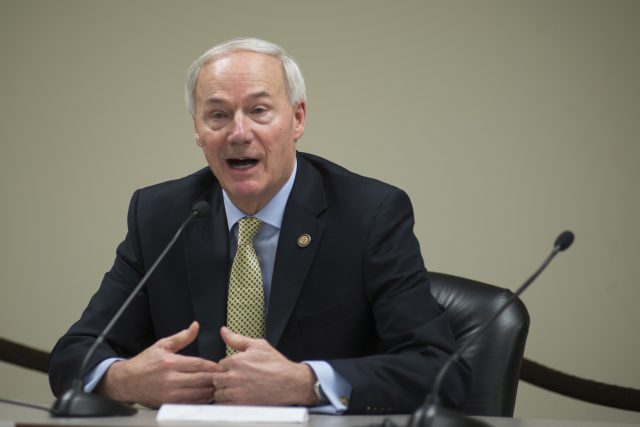
Arkansas has overcome a flurry of court challenges which derailed three other executions and put to death an inmate for the first time in nearly 12 years.
Ledell Lee’s execution was among eight originally scheduled before a lethal injection drug expires on April 30 – a plan which would have been the country’s most ambitious since the death penalty was restored in 1976.
Lee was pronounced dead at 11.56pm local time on Thursday, four minutes before his death warrant was due to expire. The 51-year-old showed no signs of consciousness two minutes after the start of his execution, which began at 11.44pm.

With his arms extended, covered with a sheet, and his head and hands covered with leather straps, Lee made no final statement and showed no apparent signs of suffering during the execution.
“The governor knows the right thing was done tonight,” said JR Davis, a spokesman for Arkansas governor Asa Hutchinson, who scheduled the multiple executions. “Justice was carried out.”
Lee was put on death row for the 1993 murder of his neighbour Debra Reese, whom he struck 36 times with a tyre tool her husband had given her for protection. Lee was arrested less than an hour after the killing after spending some of the 300 dollars he had stolen from Mrs Reese.

The state originally set four double executions over an 11-day period in April. The eight executions would have been the most by a state in such a compressed period since the US Supreme Court reinstated the death penalty in 1976. The first three executions were cancelled because of court decisions.
“I pray this lawful execution helps bring closure for the Reese family,” Attorney General Leslie Rutledge said in a statement issued minutes after Lee’s execution.
Two more inmates are set to die on Monday, and one on April 27. Another inmate scheduled for execution next week has received a stay.
The US Supreme Court cleared the way for Lee’s execution less than an hour before his death warrant was set to expire at midnight, rejecting a round of last-minute appeals the condemned inmate’s lawyers had filed. An earlier ruling from the state Supreme Court allowing officials to use a lethal injection drug that a supplier says was obtained by misleading the company cleared the way for Lee’s execution.
We are grateful and relieved that the Arkansas Supreme Court has issued a stay of execution for Stacey Johnson: https://t.co/IDYLSINeyk pic.twitter.com/od9RCBMFqX
— Innocence Project (@innocence) April 20, 2017
“Arkansas’ decision to rush through the execution of Mr Lee just because its supply of lethal drugs are expiring at the end of the month denied him the opportunity to conduct DNA testing that could have proven his innocence,” said Nina Morrison, senior staff lawyer with the Innocence Project, a non-profit legal organisation that helped represent Lee in his last appeals.
Arkansas dropped plans to execute a second inmate, Stacey Johnson, on the same day after the state Supreme Court said it would not reconsider his stay, which was issued so Johnson could seek more DNA tests in the hope of proving his innocence.


Comments: Our rules
We want our comments to be a lively and valuable part of our community - a place where readers can debate and engage with the most important local issues. The ability to comment on our stories is a privilege, not a right, however, and that privilege may be withdrawn if it is abused or misused.
Please report any comments that break our rules.
Read the rules here